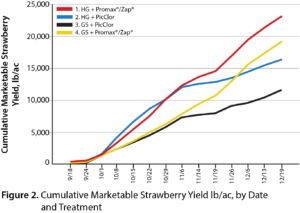
“We are pleased to present the AgriBusiness Global Industry Impact Award to Bio Huma Netics,” said Eric Davis, managing director of the AgriBusiness Group, Meister Media Worldwide. “The company has shown a dedication to the three pillars on which the award is based—and we’re proud to use our platform to recognize the positive change their company has made for the product segment and agriculture as a whole.”
The award was presented to BHN in recognition of its development and use of Micro Carbon Technology® (MCT), a proprietary blend of extremely small organic carbon- and oxygen-rich molecules. These molecules act as a source of carbon and provide an ultra-efficient vehicle to move nutrients and other molecules into plants through the soil and/or the leaves and for use by microorganisms necessary for fertile soils and for soil and water bioremediation. MCT is used in the company’s Huma Gro® (conventional farming crop nutrition and protection), Fertilgold® Organics (organic farming crop nutrition and protection), Huma Gro® Turf (horticulture, turf, and ornamentals), and Probiotic Solutions® (soil and wastewater bioremediation) product lines.
When notified that BHN had won the award, BHN CEO Lyndon Smith said, “I was in Mexico at the time. I let out a yell, I was so surprised. We’ve been around since 1973 when my father, who was a PhD plant physiologist, helped found the company. Here we are 46 years later and it’s nice to receive that recognition and recognize that he was way ahead of his time in terms of the technology that was developed. We now sell MCT-based, very efficient products in 34 other countries around the world. This has allowed us to have an impact on farmers, their customers, and the nutrient content of food consumed by many thousands of people. We’ve also been able to help provide clean water in many countries through our wastewater bioremediation efforts. We believe that we are making a significant contribution to improving the quality of life on our planet, and we will continue to do so in ways that will be multifaceted and extensive.”
More information about BHN and its Micro Carbon Technology® is available at https://bhn.us/micro-carbon-technology/.
Related Posts

Huma Gro® Nutrient and Fumigation Replacement Program Increases Strawberry Yields 97%
Conducted by: Pacific Ag Research Huma Gro® Products: Ultra-Precision™ Blend (Fresca CA Strawberry Mix), Promax®, and Zap® OBJECTIVE This field trial assessed the effects on strawberry yields of replacing field fumigation with periodic applications of Huma Gro® Promax® and Zap® and replacing a grower’s standard fertilizer program with irrigation-applied Ultra-Precision™ blended liquid Huma Gro® crop

The Fertilgold Organics Product Quality Assurance Process

Research Report: Fertilgold® 3-2-4 and Micros I Liquid Fertilizers Increase Organic Cantaloupe Yield 120%
In this study of Fertilgold® Organics macronutrient (Fertilgold® 3-2-4) and micronutrient (Fertilgold® Micros I) liquid products compared with a grower’s standard treatment on organic cantaloupes applied under field conditions in Arizona, the Fertilgold® Organics treatment powered by a proprietary Micro Carbon Technology® resulted in a 120% yield increase with a 3-to-1 return on investment (ROI).

